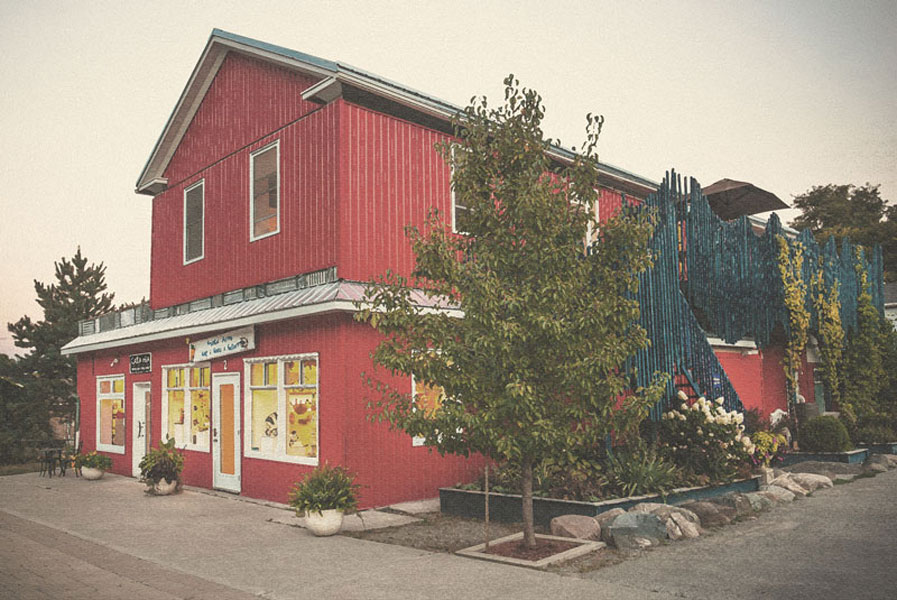The foundation of Frantic Farms was made in a Pottery and Glass Studio. It has grown with Paulus and Monica to encompass a full life of activity and work. It was named as a Farm to celebrate the rural country setting and that working in craft is about growing things, and evolving.

Monica and Paulus met in a Pottery Studio over 35 years ago. Their mutual and shared passion for making things bonded them together to build a life and a home where one’s work and one’s passions were inseparable.
They began with an exodus from the city. In the late 80’s, the Skydome was being completed, and artists were being cast out of their spaces, in what is now the Queen West / Liberty Village district of Toronto. It is a common and repeated story of the migrant artists / creatives’ role in urban renewal schisms.
Ad Hoc artist groups were popping up in small towns across Ontario from Flesherton to Lanark and Kingston to Chatham. Paulus and Monica found east of Toronto made sense with its easy access to 3 of the bigger cities in the country. Toronto, Montreal, and Ottawa could be visited in a single day’s drive. The cities offered a wide range of business opportunities, such as craft shows, and retail shops and galleries. Cultural benefits and culinary delights were enticing as well.
In 1989, they bought a farmhouse which became the first Frantic Farms’ location. The first renovations were hurried, with a pottery studio built into the summer kitchen of the main house. Next was a farmgate style showroom in the garage. Then the first new building went up to house a glass studio. The renovations and building have never really stopped. Every year for 30 years, each season brought ambitious plans and a routine of work. Summer was best to do outside things, Winter was for inside tasks, Fall and Spring for creative work.
In the 90’s, Paulus and Monica had children. Reading books, sharing stories, meals and laughs influenced studio work. For pottery, it became more functional with fun details now and then. For Glass, it was frenzied, colourful painting, and cartoon-like sculpture.
They fortunately survived the Y2K doomsday prediction. With the new millenia, Frantic Farms looked to expand. Paulus began to present and sell glass in the United States. In 2005, Monica’s pottery studio and the farmgate style showroom was moved into the town of Warkworth. The year before, Frantic Farms had purchased the decrepit building. A building which was one of the largest structures, and the geographical center of Warkworth. On the verge of being condemned as unfit for human occupation, Paulus and Monica dove in, with their naive artistic vision to transform the building.
Simultaneously, back on the farm, molten glass continued to flow out of the furnace, and emphasis was placed on evolving farm activities and spaces. Chickens were ranging freely. The glass studio had a hen mascot named Betty that would boldly sit on the marver table to watch the team work in the glass studio. Garlic began to grow in the field behind the house and studio. Monica and a cohort of potters built a 36 cubic foot wood fired kiln in the small barn. The kiln was literally a massive undertaking. There were 3000 bricks in the catenary archway and another 3000 in the flue and chimney, with each brick weighing in an average of 6 lbs, placed into position by hand.
There was frantic activity at Frantic Farms, but it was time for pause, and reflection.
In 2010, Paulus pulled out of the US market. Frantic Farms opened Caramia Bakery in an adjacent space, next to Monica’s pottery studio and Frantic Farms Gallery. With diminished hours in the glass studio, Frantic Farms’ primary employee, Teresa McPherson, easily transferred to working in the bakery. It turns out that baking has a close relation to glass working and pottery.
In 2015, Frantic Farms turned 22 years old as a business and 27 years as a concept. To carry on with the theme of working smarter, Paulus and Monica sold Caramia Bakery, and redoubled their efforts to focus on working closer to home. By 2018, the decision was made to no longer travel to craft shows, with very few exceptions. Advertising and promotion was directed to the growing daytripper and weekender crowd from urban centers. With less travel and away time from the studio, more energy was given to wood firing frequency, and developing new lines of work. Most notably at the farm, a newish blue tractor, named “Babe” was purchased and used to continue rehabilitation of the property, and new lines of garden and home decor lighting is flowing from the glass studio.
At first, 2020, the year of COVID 19 and isolation, brought trepidation. Though there was some financial pressure, the isolation provided a less frenzied pace and time to revisit and rework old and incomplete projects. For Paulus, order came to the piles of objects,and bits of material laying about the yard, that had been accumulated for ambitious projects. Monica had productive sessions in the studio, in sweet solitude, not experienced since her studio was moved to town and closer proximity to retail shoppers.
Become a friend or patron. Get irregular updates by receiving our email newsletter, 4 to 6 times per year.
© 2020 Frantic Farms Pottery & Glass. All right reserved.
SITE DESIGN: